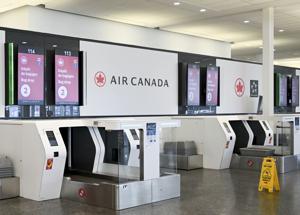Air Canada has postponed its plans to resume flight operations, initially set for Sunday, following a defiance of a return-to-work order by the union representing 10,000 flight attendants. The Canada Industrial Relations Board mandated that airline staff return by 14:00 on March 3, 2024, but the Canadian Union of Public Employees (CUPE) announced its members would not comply.
The airline intended to restart its flights on Sunday evening but has now shifted that timeline to Monday evening. In a statement made outside Toronto’s Pearson International Airport, CUPE national president Mark Hancock declared, “Our members are not going back to work. We are saying no.” He criticized the return-to-work order as “unfair” and indicated plans to challenge it as unconstitutional, stating, “Air Canada has really refused to bargain with us.”
Federal intervention came quickly after the flight attendants walked off the job around 01:00 EDT on Saturday. Patty Hajdu, the Federal Jobs Minister, emphasized that the current economic climate did not allow for risks, particularly given the unprecedented tariffs imposed by the United States on Canada. She referred the situation to the Canada Industrial Relations Board, which has now extended the existing collective agreement until a new one is established by an arbitrator.
The impact of the airline’s operational halt is significant, affecting around 130,000 passengers per day. Prior to the cancellation, Air Canada operated approximately 700 flights daily. Reports from aviation analytics provider Cirium indicated that Air Canada canceled a total of 494 flights on Sunday morning, adding to hundreds of cancellations over the preceding days.
The tension between the airline and its flight attendants escalated on Friday when CUPE rejected a request from Air Canada to enter into government-directed arbitration. This would have allowed a third-party mediator to establish the terms of a new contract. Following the union’s refusal, Air Canada announced it would begin locking flight attendants out of airports.
While the government previously intervened in labor disputes, including a recent situation involving Canada’s major railroads, CUPE has expressed concern that such actions undermine union leverage in negotiations. The Business Council of Canada had called for binding arbitration in this instance, while the Canadian Chamber of Commerce welcomed the federal involvement.
Hajdu defended the government’s position, stating that it was not anti-union but recognized that both parties were at an impasse. Passengers affected by the cancellations are eligible for refunds through Air Canada’s website or mobile app. The airline has also indicated it will seek to provide alternative travel options with other carriers. However, it cautioned that immediate rebooking cannot be guaranteed due to high demand during the summer travel peak.
Negotiations between Air Canada and CUPE have been ongoing for approximately eight months without a tentative agreement. Central to the disagreement are issues regarding pay and the unpaid work flight attendants perform while on duty but not in the air. Air Canada’s latest proposal included a total compensation increase of 38% over four years, which the airline claimed would make its flight attendants the best compensated in Canada. CUPE countered that the proposed 8% raise in the first year was insufficient given inflationary pressures.
As the dispute continues, Air Canada faces a complex situation that not only affects its operations but also impacts many travelers who rely on its services.
